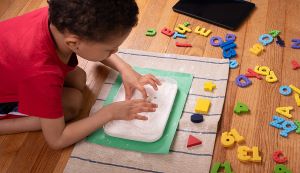 A new study published in the Journal of American Academy of Pediatrics looked at kindergarten readiness, later health, and social costs.
A new study published in the Journal of American Academy of Pediatrics looked at kindergarten readiness, later health, and social costs.
“We used kindergarten readiness measures to forecast later academic, psychological, and health risks by end of high school,” study author Linda Pagani told us. “We wanted long term evidence of the importance of ensuring that all children are ready to learn at the time of school entry was crucial to support the idea of that prevention for all kinds of social problems have their origins in early childhood.”
The Human Capability theoretical framework focuses directly on the quality of life that individuals can achieve. This is analyzed in terms of the core concepts of people’s potential 'functioning' and 'capability' as core members of society.
“The production of human capability starts, of course, with conception and a good pregnancy, but after that the first five years are make it or break it for many children in society,” Pagani told us. “The 20th century expression that all one really needs to know they learned in kindergarten appeals to us for its health, social, and economic implications.”
A compelling way to evaluate that adage would be to examine the extent to which cognitive and learning skills predict long-term outcomes and indictors of life success.
“As an academic, I have spent the last 25 years believing that kindergarten readiness is an effective strategy to help individuals in society to gain access and control over wealth,” Pagani told us. “As Canadians, we spend a lot in our social programing and like to invest in people. Parents put a lot into their children and into paying taxes. The key is get political strategists, professionals, and society in general on board with the idea that if our children start formal schooling a solid foot then they have better chances to grow up, reach their potential, and even repay their debt to society as a tax payer, good parent, and social participant.”
This study is based on 966 Canadian boys and girls from the Quebec Longitudinal Study birth cohort. They were born between spring 1997 and spring 1998. At age five, trained examiners assessed child number knowledge and receptive vocabulary. Teachers reported kindergarten classroom engagement. At age 17, participants reported academic grades, school connectedness, anxiety, sensitivity, substance abuse, physical activity involvement, and height and weight. High school dropout risk was also estimated for each participant based on grades, school engagement, and grade retention.
“Kindergarten math skills significantly contributed to better end-of high school grades and ultimately lowered dropout risk,” Pagani told us. “Having a good receptive vocabulary predicted lower sensitivity to anxiety. We need that in the work force.”
Being on task and involved in the kindergarten classroom predicted higher end of high school grades, better school connectedness, a lower risk of substance abuse, and more involvement in physical activity. Kindergarten classroom engagement was also associated with a 65% reduction in the odds of being overweight at age of 17.
These findings were adjusted for key child characteristics (sex, weight per gestational age, nonverbal IQ, and internalizing and externalizing behaviors) and family characteristics (parental involvement, maternal depression and immigrant status, family configuration, and socioeconomic status) that could have been a confounding nuisance in the interpretation of the findings.
“We were thrilled with the results,” Pagani told us. “Such a longitudinal follow-up of school readiness on later indicators of vocational success provides compelling evidence of the importance of ensuring that all children are ready to learn at the time of school entry.”
Early childhood readiness forecasts a protective edge by emerging adulthood. With
these findings, the researchers build links showing how education is a protective factor for health, suggesting that children who start school prepared gain a lifestyle advantage. Promoting kindergarten readiness could reduce the health burden generated by high school dropout and just make better equipped people out there in all walks of life.
“Starting kindergarten on the right foot means implementing a host of protective factors that are within our reach,” Pagani told us. “We need to respect screen time guidelines of no screen time before age 1.5, not much between 18 months and age two and not more than an hour between ages two and five.”
Preschool-aged children (ages three through five years) should be physically active throughout the day for growth and development. Infants (aged less than one year) should be physically active several times daily – particularly through interactive floor-based play. Toddlers (aged one–two years) and preschoolers (aged three–four years) should accumulate at least 180 minutes of physical activity at any intensity spread throughout the day, including: A variety of activities in different environments; Activities that develop movement skills; Progression toward at least 60 minutes of energetic play by five years of age.
“More daily physical activity provides greater benefits for socio-emotional-cognitive development and general health,” Pagani told us. “Lastly, children are wired for real-life social interactions of all kinds to stimulate their verbal, math, reasoning, and social skills. This will help them hit the ground running in kindergarten.”
Patricia Tomasi is a mom, maternal mental health advocate, journalist, and speaker. She writes regularly for the Huffington Post Canada, focusing primarily on maternal mental health after suffering from severe postpartum anxiety twice. You can find her Huffington Post biography here. Patricia is also a Patient Expert Advisor for the North American-based, Maternal Mental Health Research Collective and is the founder of the online peer support group - Facebook Postpartum Depression & Anxiety Support Group - with over 1500 members worldwide. Blog: www.patriciatomasiblog.wordpress.com
Email: tomasi.patricia@gmail.com